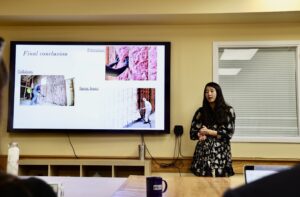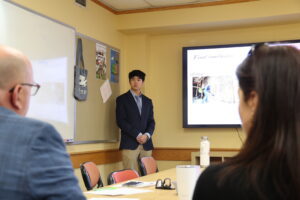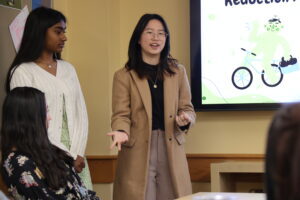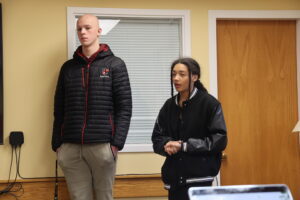January 18, 2024
Literature of Climate Change Class Investigates Green Solutions at KO
Students in the Literature of Climate Change class gave presentations on innovative green initiatives that could revolutionize the KO’s approach to sustainability. These presentations, focusing on insulation options, resource reduction, food waste and eco-friendly practices, shed light on actionable steps that can be taken to create a more environmentally conscious campus. For an interactive component, the groups conducted surveys of at least 40 people (students, staff) at KO and had follow-up conversations on their topic with at least half of them. The groups presented their findings to a panel of Head of School Tom Dillow, Head of the Upper School Lisa Loeb, Upper School science teacher Alexa Tzanova, and the class’s instructor Dan Gleason.
The assignment
You will put your learning about climate change mitigation and adaptation strategies, key climate persuasion principles, and the receptivity of the KO community into action. Working together with your group on your shared topic, you will present to KO administration a set of proposals to address climate change within our own community.
The Presentations
Green Roofs and Insulation/ Martin and Ava
The first presentation delved into green roofs and insulation choices, emphasizing the impact on energy efficiency and environmental sustainability. Three types of insulation were discussed: loose-fill insulation, traditional insulation, and spray foam insulation.
Loose Fill Insulation: The speaker highlighted loose-fill insulation, composed of 85% recycled materials such as newspapers and denim, as a more eco-friendly option. While cost-effective, it was noted that loose fill insulation might not be as durable and could shift, leading to thermal bridges and potential mold issues.
.
Traditional Insulation: This type requires tearing down walls for installation, making it less flexible than loose fill. However, it was emphasized that traditional insulation is permanent and does not pose the same risks as loose fill.
Spray Foam Insulation: Considered the most expensive but highly efficient in energy savings, spray foam insulation offers durability, air sealing, and a one-time installation. The presenter recommended it for its long-term cost-effectiveness and positive impact on heating and cooling efficiency.
The audience raised questions about the applicability of these options to larger spaces, such as the upcoming Community Commons renovation. While the speaker acknowledged the importance of insulation in such projects, detailed calculations and considerations for specific spaces would need to be researched.
The team researched building a green roof on Roberts to aid in stormwater management, energy efficiency, and air quality. In the summer, heat gain can be up to 84% lower than traditional roofs, and in the winter, heat loss is approximately 34% lower. Transitioning to these roofs would save .53-.99 gigatons of CO2 emissions from 2020-2050. Extensive work was done on the upfront costs and financial impact of the implementation of green roofs at KO.

Resource Reduction/Minnila M, Alexa P., Link L, Chuck H.
Another presentation focused on resource reduction, specifically addressing the environmental impact of hand dryers versus paper towels, paper recycling, automatic lights, and automatic faucets to create a more sustainable campus. The team emphasized the role of resource reduction in mitigating greenhouse gas emissions and ensuring a sustainable future for coming generations. Survey data revealed that over 50% of the school community did not actively participate in resource reduction efforts, highlighting the need for awareness and engagement.
Environmental Impact of Paper Towels: The presenter shared data indicating that paper towels contribute to deforestation and emit significant amounts of carbon dioxide. The misconception about their recyclability was also addressed.

Benefits of Hand Dryers: Hand dryers, particularly energy-efficient models, were presented as a more sustainable option, emitting significantly less carbon dioxide per use than paper towels.
Cost Analysis: The speaker provided a cost analysis, considering the one-time installation cost of hand dryers, installation labor costs, and annual electricity costs. While acknowledging the initial investment, the presenter argued that the long-term benefits, both environmentally and economically, outweighed the upfront expenses.
The Q&A session raised queries about the hygiene and efficiency of hand dryers compared to paper towels. Scientific studies supporting the cleanliness of hand dryers were mentioned, emphasizing the need for evidence-based decision-making.
The Q&A session discussed the potential impact of energy bill programs on institutional resource reduction efforts, indicating the need for further research into cost subsidies for schools and businesses.
Food Waste/Loretta S, Sean H.
This team provided startling facts about food waste, which creates 8% of greenhouse gas emissions, 2.5 billion tons of food waste per year, and 3.4 million acres used to grow wasted food.
Food waste relies on behavioral changes; therefore, no real costs are associated with moving in this direction. According to a survey of our students, 49% said we should expand our community and garden, and 39% suggested separating waste in the dining hall.
If the school expands the community garden, it can increase food production, compost on-site, and provide educational and curriculum opportunities.
Regarding food rescue, non-compostable food can be put to good use. Food rescues are companies that pick up food from partnering restaurants, grocery stores, and bakeries.. 51% of respondents said they would help Sage Dining package leftover food to donate to rescues. The costs include a $1,200 set-up fee, $1– per week charge, and two weekly pick-ups.
Conclusion
These presentations collectively underscored the importance of adopting green initiatives at KOl, from sustainable insulation choices to resource reduction strategies. As the school considers renovations and improvements, these presentations provide valuable insights into creating a greener and more environmentally conscious campus. We can take significant strides towards fostering sustainability and contributing to the global fight against climate change by implementing these initiatives.
